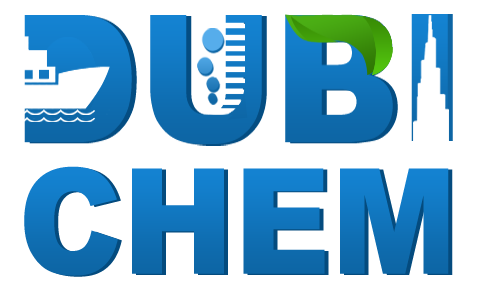
Dubi Chem is one of the Acetic acid manufacturers, exporters, producers, and suppliers in Fujairah, Sharjah, Abu Dhabi, Ajman, Ras Al Khaimah, Kuwait, Muscat, Dubai UAE. We are supplied to various industrial markets including Household, Institutional Cleaning, Personal Care, and Industrial sectors including Oil fields, chemical, Animal feed additive, Food additive, Agrochemical, Fertilizer, pharmaceuticals, water treatment, Minerals, Lubricants, Marine Industry, Metal Working chemical industry, and Coatings markets.
Acetic acid is the second simplest carboxylic acid (after formic acid). It is an important chemical reagent and industrial chemical, used primarily in the production of cellulose acetate for photographic film, polyvinyl acetate for wood glue, and synthetic fibres and fabrics. In households, diluted acetic acid is often used in descaling agents. In the food industry, acetic acid is controlled by the food additive code E260 as an acidity regulator and as a condiment. In biochemistry, the acetyl group, derived from acetic acid, is fundamental to all forms of life. When bound to coenzyme A, it is central to the metabolism of carbohydrates and fats.
Glacial acetic acid as one of most important organic raw materials, it is mainly used in such products asvinyl acetate, acetic anhydride, diketene, acetate ester, acetate, acetate fiber and chloroactic acid etc. It is an important raw material for syntesized fiber, gooey, medicines, pesticides and dyes, and also a good organic solvent. It is widely applied in such industries as of plastics, rubbers and printing etc.
Acetic acid is a chemical reagent for the production of chemical compounds. The largest single use of acetic acid is in the production of vinyl acetate monomer, closely followed by acetic anhydride and ester production. The volume of acetic acid used in vinegar is comparatively small.
Glacial Acetic Acid Application:
1. Synthetic vinyl acetate, cellulose acetate, acetic anhydride, acetate, metal acetate and halogenated acetic acid.
2. It is an important raw material for pharmaceuticals, pesticides and other organic synthesis.
3. It is also widely used in the manufacture of photographic medicine, cellulose acetate, textile printing and dyeing, and rubber industry.
4. Used in the production of ethyl acetate, edible spices, wine spices, etc.
5. Used as analytical reagent, solvent and leaching agent.
Application
1. Water treatment
2. Construction
3. Textile dyeing
4. Chemical industry
5. Synthetic fiber
6 Paint
7. Plastic,etc
Glacial acetic acid uses
1. Acetic acid is a bulk chemical product and one of the most important organic acids. It can bemainly used to produce vinyl acetate, acetic anhydride, acetate and cellulose acetate. Polyvinyl
acetate can be used to prepare films and adhesives. It is also the raw material of synthetic fiber vinylon.
2. Cellulose acetate can be used to make rayon and film.
3. Acetate is an excellent solvent and is widely used in paint industry.
4. Acetic acid can also be used to synthesize acetic anhydride, diethyl malonate, ethyl acetoacetate,haloacetic acid, etc. it can also be used to manufacture drugs such as aspirin and acetate. It is widelyused in pesticide, medicine and dye, photographic drug manufacturing, fabric printing and dyeing and rubber industry.
5. In the food industry, acetic acid is used as acidifier, flavor enhancer and flavor.
6. Acetic acid has the function of preservative.
Other derivatives
Organic or inorganic salts are produced from acetic acid. Some commercially significant derivatives:
Sodium acetate, used in the textile industry and as a food preservative (E262).
Copper(II) acetate, used as a pigment and a fungicide.
Aluminium acetate and iron(II) acetate—used as mordants for dyes.
Palladium(II) acetate, used as a catalyst for organic coupling reactions such as the Heck reaction.
Halogenated acetic acids are produced from acetic acid. Some commercially significant derivatives:
Chloroacetic acid (monochloroacetic acid, MCA), dichloroacetic acid (considered a by-product), and trichloroacetic acid. MCA is used in the manufacture of indigo dye.
Bromoacetic acid, which is esterified to produce the reagent ethyl bromoacetate.
Trifluoroacetic acid, which is a common reagent in organic synthesis.
We are trying our best to supply every chemical you may wish to buy. However, if there is something you can’t find, feel free to contact us and we will find just what you are looking for and offer you a competitive price. We have many customers in the United States, Canada, Mexico, Australia, United Kingdom, and European Union countries and retain long-term cooperation. For more information or to request a particular product, call customer services or Given website Email address.
